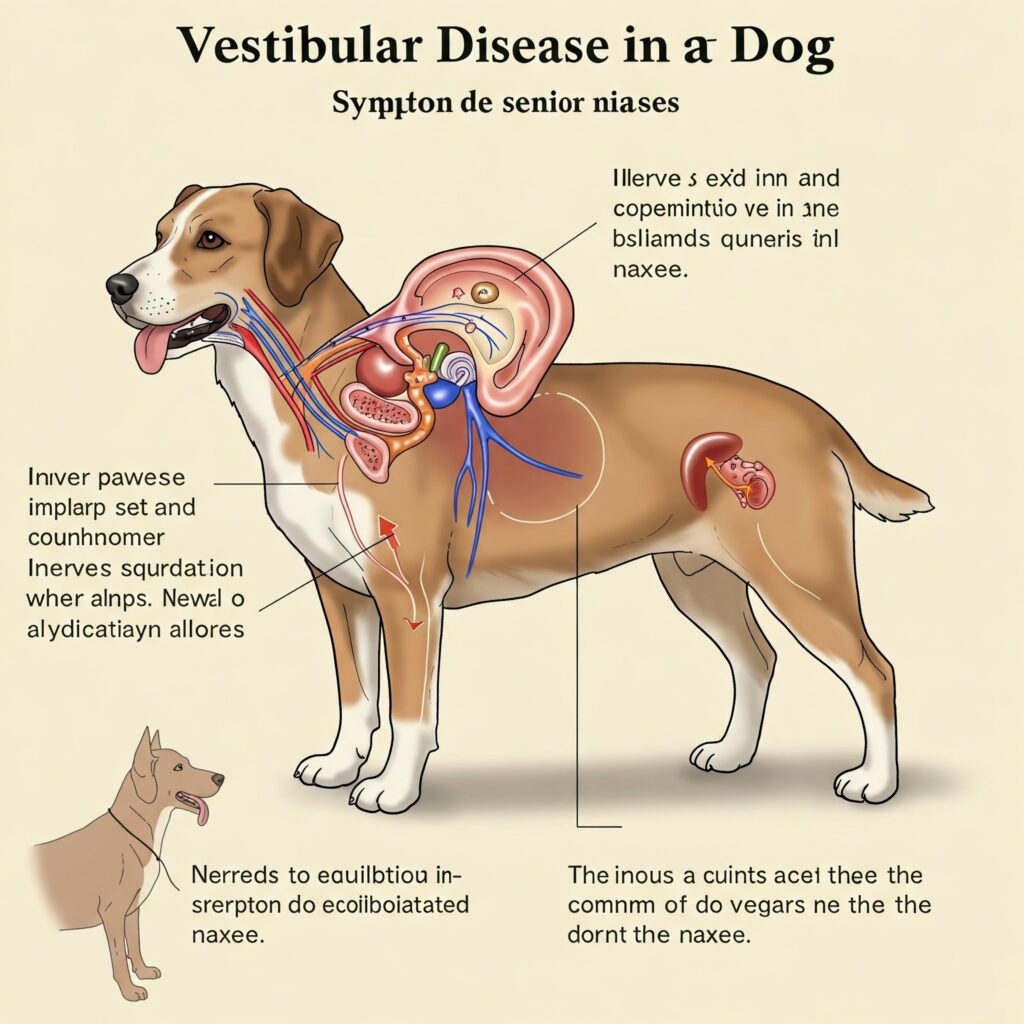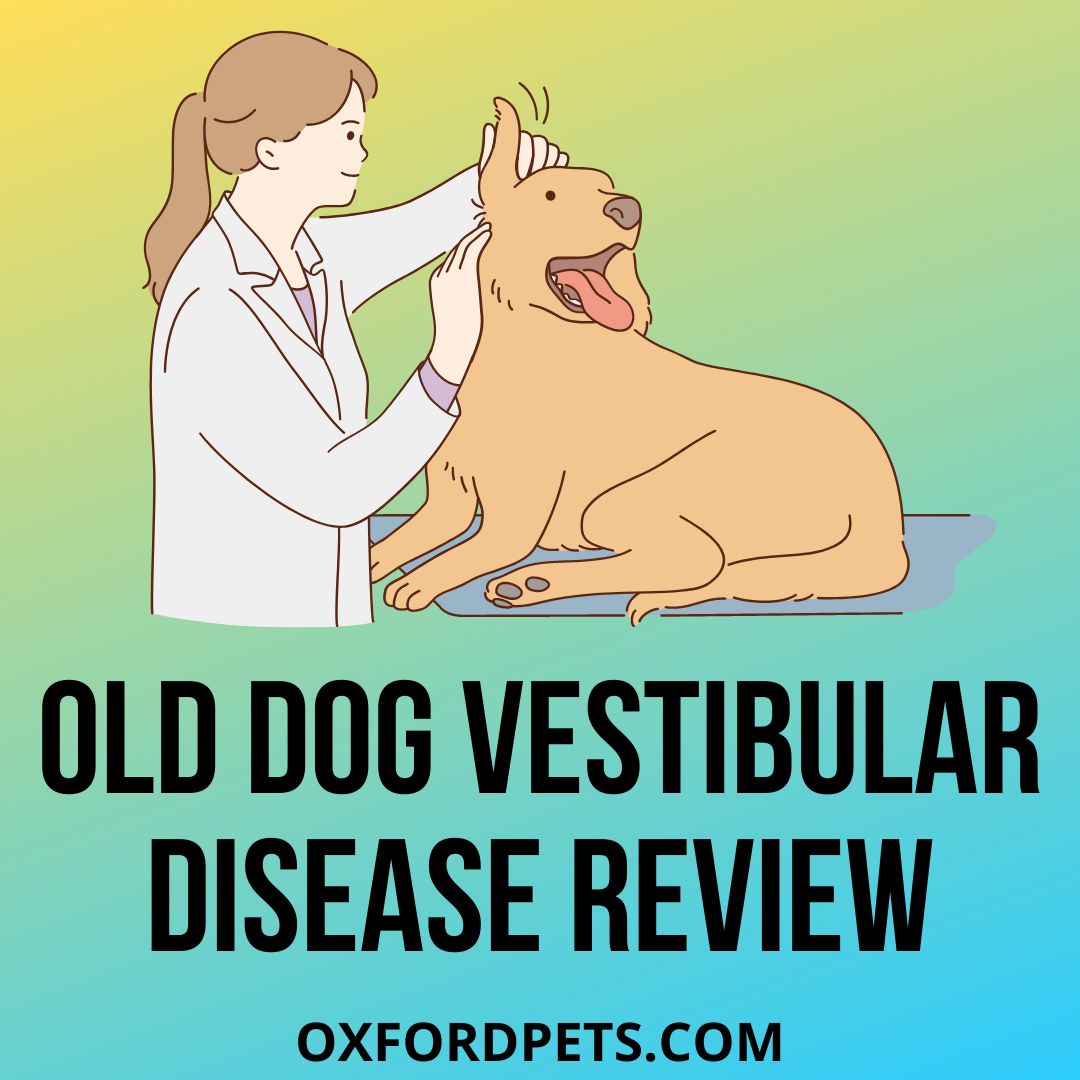Dog vestibular disease is a term that reflects abnormality in the vestibular part (balancing) of the nervous system. Moreover, the central nervous system (a few brain parts, inner ear, and middle ear) is affected.
For those who don’t know what is the vestibular system-
The vestibular system is a kind of sensory system. Therefore, it is responsible for balance and spatial awareness. This vestibular disease is also known as the old dog’s disease as it usually affects aged canines.
Contents
- How Does A Canine With A Vestibular Disease Feel?
- Old Dog Vestibular Disease: Symptoms, Causes, and Cure
- How Veterinarians Diagnose Vestibular Disease in Dogs
- Treatments for vestibular disease in dogs
- Management tips for dogs with vestibular syndrome
- How Do I Know When To Euthanize My Pet?
- Final Words
- Frequently Asked Questions
- How long do dogs live with vestibular disease?
- What triggers vestibular disease?
- Are dogs with vestibular disease in pain?
- Can Benadryl help vestibular disease in dogs?
- Is vestibular disease in dogs a stroke?
- Can vestibular disease cause death?
- Can dogs with vestibular disease sleep?
- How many times can a dog get vestibular disease?
How Does A Canine With A Vestibular Disease Feel?
A canine with dizziness or vertigo finds it difficult to stand. This happens due to the lack of a sense of balance. Moreover, this is due to the disturbance in the inner ear.
Additionally, they can get confused about things happening around them as they lack perspective. A canine with this issue feels sick when he wakes up. Moreover, you may also notice his eyes rolling and confused expressions.
However, the good news is that if you understand this earlier, symptomatic and palliative treatment are considered options that can help with some sort of recovery. Also, there are many medicines available to control vomiting and nausea related to vestibular disease. Additionally, rehabilitation also helps.
However, some canines(majorly larger breeds) do not cope well with the disease. Also, the recovery time is more than usual. Moreover, there is no guarantee about the degree of recovery.
Old Dog Vestibular Disease: Symptoms, Causes, and Cure

Symptoms
Old Dog Vestibular Disease, also known as Canine Idiopathic Vestibular Syndrome, primarily affects a dog’s balance and coordination. Common symptoms include:
- Loss of Balance: Dogs may stagger, stumble, or fall over.
- Head Tilt: A noticeable tilt to one side.
- Nystagmus: Rapid, involuntary eye movements.
- Nausea and Vomiting: Often due to dizziness.
- Circling or Leaning: Dogs may walk in circles or lean to one side.
- Loss of Appetite: Difficulty eating due to nausea.
- Confusion or Disorientation: Dogs may appear dazed or unsure of their surroundings.
Causes
The condition can arise from various factors, including:
- Idiopathic (Unknown Causes): Most cases have no identifiable cause.
- Inner or Middle Ear Infections: These can disrupt the vestibular system.
- Trauma or Injury: Damage to the head or ear.
- Hypothyroidism: A hormonal imbalance affecting the nervous system.
- Toxicity: Certain medications can harm the vestibular system.
- Tumors or Polyps: Growths in the ear or brainstem.
- Stroke or Vascular Issues: Rare but possible causes.
Cure and Treatment
While Old Dog Vestibular Disease can be alarming, it is often not life-threatening and resolves with supportive care. Treatment options include:
- Supportive Care: Ensure your dog is comfortable and safe from falls.
- Medications: Anti-nausea drugs and sedatives can help manage symptoms.
- Treat Underlying Causes: If an ear infection or other condition is identified, targeted treatment is necessary.
- Hydration and Nutrition: Encourage eating and drinking to prevent dehydration.
- Physical Therapy: Gentle exercises can help regain balance and coordination.
- Time: Idiopathic cases often improve within a few days to weeks.
If symptoms persist or worsen, consult a veterinarian immediately to rule out more serious conditions. Let me know if you’d like further insights or assistance!
How Veterinarians Diagnose Vestibular Disease in Dogs

The vet will need your canine’s medical history, current medicine, and some neurological tests. Then the physical test will confirm the signs of vestibular disease. If the disease is confirmed, then the neurological tests tell if it is a peripheral dysfunction or a central dysfunction.
Therefore, based on that, the vet will determine the specific test. These tests can include:
Complete blood count: Confirms if there are any blood-related abnormalities or systemic infections. For instance, anaemia can cause similar signs as a vestibular disease.
Ear cytology: The vet will take a sample of debris from the ear to identify bacteria, yeast, or mites that cause ear infections. Based on the symptoms and the test results, the vet can tell you if an ear infection has caused the disease or not.
Urinalysis: Urinalysis, with other tests, can identify the exact cause of the disease.
Internal organ function or biochemistry test: It cannot find cancer location, the test can tell if further cancer or any other organ dysfunction test is needed.
Advanced imaging: X-ray or CT scan can confirm the doubt of tumours.
Treatments for vestibular disease in dogs
If your canine has an idiopathic vestibular disease and he cannot eat or is dehydrated from vomiting, you must consider keeping him in the vet clinic. If he starts eating and drinking well, the vet will send him home.
To be honest, time is the best cure for dog vestibular disease. However, this does not mean your canine has to suffer. The vet will provide some anti-nausea medicine or sedatives if the canine is too stressed.
Moreover, you need to protect your canine by making the home safe for him to move around. Keep the furniture at a distance, do not let him use stairs, keep sharp objects away, etc. also, you need to take him outside for pee and poop. Place food and water bowls close to him so that he can access them easily.
In the past, vets used to prescribe Corticosteroids. However, now scientific evidence shows that it is not that effective for vestibular disease.
Management tips for dogs with vestibular syndrome

Safer homes include:
- Monitoring eating, drinking, defecation, urination, ambulation, etc.
- Easy access to food and water
- Quiet place to sleep
- Avoiding major changes
- Surface for mobility aids
- Keeping the dog in a safe space
For end-of-life care:
- Evaluating quality of life
- Monitor discomfort
- Keeping the canine safe
- Track progression of health
- Give proper hydration and nutrition
In difficult situations:
Talk to your vet if your canine is not eating, vomiting, vocalising in pain, or collapsing. Before the situation gets worse, it is better to have an end-of-life care discussion.
How Do I Know When To Euthanize My Pet?
It is unnecessary to think of euthanizing the dog immediately. If you see his health decline, you must have a word with the vet first. If he suggests the same, then you must go for it. Putting your canine to sleep is best in some cases, it relieves them from the immense pain.
Several factors like age, severe symptoms, the severity of the disease, and overall health are taken into consideration before euthanizing the pet. Therefore, it is better to let the vet decide what is best for your canine suffering from dog vestibular disease.
- This listing is for a brand new item with a guaranteed fresh expiration date. A chewable dietary supplement of soluble zinc methionine for dogs.
- Administer one (1) chewable tablet each day to provide 15 mg of zinc per day for each 20 lbs. of body weight.
- Ingredients Zinc methionine, liver meal, roast beef flavor, dried whey, calcium carbonate, and artificial color.
- Situational Anti-diarrheal for Dogs and Cats – Contains kaolin and pectin to help firm loose stools and helps soothe your pet’s irritated, unsettled, or upset digestive system.
- Rapid Relief – A specialized formula with beneficial probiotics for dogs and cats designed to alleviate loose stool quickly and effectively.
- Gentle on the Digestive System – Formulated with gentle yet effective ingredients, this remedy soothes your pet’s digestive system without causing additional discomfort and has a tasty chicken flavor.
- Suitable for Dogs and Cats – Whether you have a canine companion or a feline friend, Pro-Pectalin Tablets are ideal for pets of all breeds and sizes and may help with situational diarrhea relief.
- Easy Administration – Convenient chewable tablet format allows for hassle-free administration, directly into your pet’s mouth or given with their food, ensuring easy consumption without fuss.
- Specially Formulated for Dogs – If your dog lives in mosquito-prone environments or requires regular heart health maintenance, this supplement offers gentle monthly support to help maintain a balanced internal system and provide heart-conscious care for long-term wellness.
- Supports Heart & Internal Wellness – This chewable tablet is designed specifically for dogs and can be used monthly to help support a heart-focused wellness routine. It helps maintain internal balance during seasonal exposure and is ideal for dogs on preventive care plans.
- Pet Formula – Each chewable tablet contains 7.5mg of a high-purity formula, crafted with care to be mild, non-irritating, and suitable for long-term use. Regular monthly use promotes internal comfort and supports your dog’s heart-focused wellness routine.
- Easy to Feed – These chewable tablets are easy to give directly or crush into your dog’s food—no powders, no mess. Made without artificial additives or unnecessary fillers, it’s a simple way to support your dog’s monthly care plan.
- Vet-Trusted Wellness Companion – Whether you’re maintaining heart health or practicing routine internal care, this supplement offers reliable monthly support. With veterinary-trusted ingredients, it helps you confidently manage your dog’s long-term internal wellness—giving both you and your dog peace of mind.
- Recommended for dogs diagnosed with congestive heart failure (CHF)⁴ due to clinical myxomatous mitral valve disease (MMVD) or dilated cardiomyopathy (DCM).
- According to published studies, helps extend the survival time and improve the quality of life in dogs with heart failure¹,².
- Available as a highly palatable, beef-flavored chewable tablet in 4 convenient dosing sizes (1.25 mg, 2.5 mg, 5 mg, and 10 mg) for small, medium, large, and extra-large dogs.
- Prescription required
- Manufactured by Boehringer Ingelheim
- Proven effective in reducing or eliminating urinary incontinence¹
- 93% of dogs treated were improved or continent by 6 weeks¹
- Convenient, once-a-day dosing
- One simple starting dose for all female dogs
- 1. Byron JK, Taylor KH, Phillips GS, and Stahl MS. Urethral Sphincter Mechanism Incompetence in 163 Neutered Female Dogs: Diagnosis, Treatment, and Relationship of Weight and Age at Neuter to Development of Disease. J Vet Intern Med. 2017;31:442–448.
Final Words
In conclusion, I would say that dog vestibular disease is not a fatal disease. However, if you do not pay attention at the right time, it can cause major issues in your beloved canine. Therefore, it is better to track the symptoms at an early stage.
Moreover, it’s best to take suggestions from the vet in case you doubt your canine is having the vestibular disease. The vet can guide you through the correct procedure.
I hope you enjoyed the article. I will be back soon with more interesting and informative articles. Till then, stay connected. Thank you
Frequently Asked Questions
How long do dogs live with vestibular disease?
Dogs with vestibular disease do not die in most cases. It is not a fatal disease. Additionally, it requires 2 to 3 weeks to recover from it completely.
What triggers vestibular disease?
Most common causes of vestibular disease include infections and medicines. Ear problems like poor circulation in the ear can cause this disease in your canine.
Are dogs with vestibular disease in pain?
No. Vestibular disease is not dangerous or painful. However, it causes huge discomfort and sickness to your dog. Additionally, there is a loss of coordination in your canine. Also, it will be cured in 2 to 3 weeks.
Can Benadryl help vestibular disease in dogs?
Yes, somewhat. Benadryl can reduce the seriousness of head tilts during vestibular disease. It helps the canine and is completely safe for canines to consume. Additionally, benadryl decreases anorexia and anxiety in canines
Is vestibular disease in dogs a stroke?
Vestibular disease in dogs looks like a stroke. It is a small inflammation of the vestibular nerve. Additionally, this nerve goes to the ear and brain. Hence, if this nerve is affected, the body balance of your canine will be affected.
Can vestibular disease cause death?
No. Vestibular disease is not fatal. Moreover, many of its symptoms heal themselves. However, it is better to talk to the vet to mitigate the seriousness of the disease.
Can dogs with vestibular disease sleep?
Yes, dogs with vestibular disease do sleep. However, they may opt to sleep on the floor rather than their bed. This is because the hard surface will help them to mitigate being awakened by the signals of vestibules.
How many times can a dog get vestibular disease?
Vestibular disease occurs only once in a lifetime. However, there are some rare cases where the disease has occured 3 or more times.





